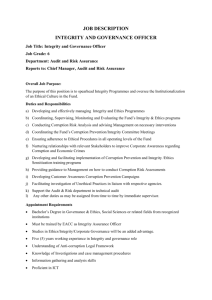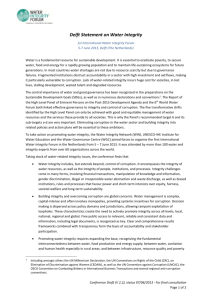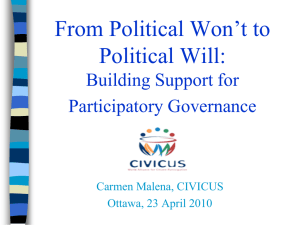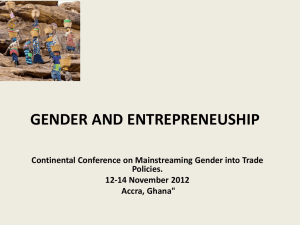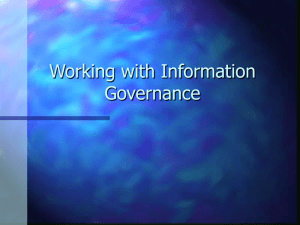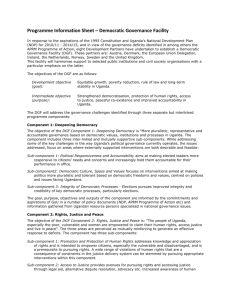local governance in the 21st century: fraud, corruption and ethics
advertisement
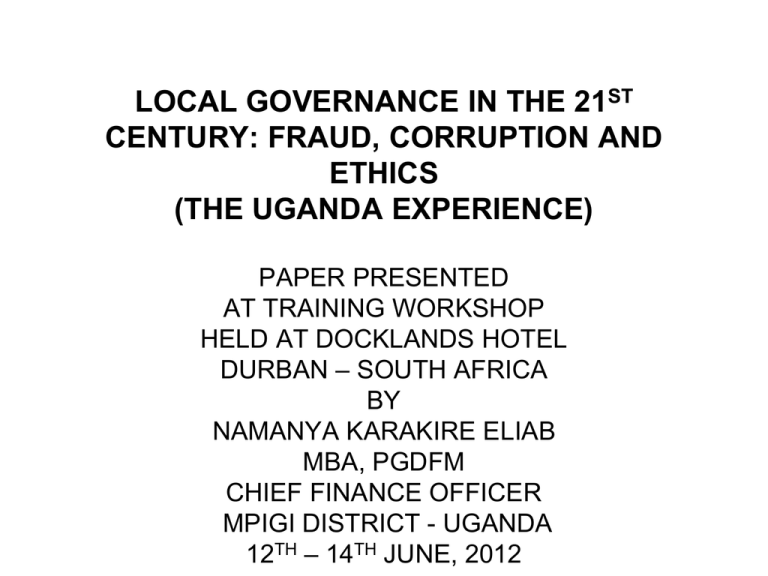
LOCAL GOVERNANCE IN THE 21ST CENTURY: FRAUD, CORRUPTION AND ETHICS (THE UGANDA EXPERIENCE) PAPER PRESENTED AT TRAINING WORKSHOP HELD AT DOCKLANDS HOTEL DURBAN – SOUTH AFRICA BY NAMANYA KARAKIRE ELIAB MBA, PGDFM CHIEF FINANCE OFFICER MPIGI DISTRICT - UGANDA 12TH – 14TH JUNE, 2012 1.0 Introduction The Government of Uganda operates under a legal framework in terms of Local Governance. The Constitution of the Republic of Uganda, 1995, Article 197 provides for Local Governments, their functions and operations. The Local Governments Act Cap 243 establishes the system of Local Governments and administrative units in Uganda. Local Governments are body corporate and may therefore sue or be sued in their corporate name. The same Act also describes the Local Government set up with the Council as a highest political authority with legislative and executive powers exercised in accordance with the Constitution and the Act. For purposes of good and democratic local governance, the same Act outlines how Local Government Councils elections are to be held for good and participative representation in the above councils • This Act of parliament in Uganda provides for inspection and monitoring of Local Governments by line ministries and other state organs authorized by law to promote adherence to the law which includes among other. • Adherence to the rule of law and principles of natural justice and good governance. • Foster elimination of corruption and abuse of office. 2.0 Governance: Definition: • The combination of processes and structures implemented by the Local Government council and or management in order to inform, direct, manage and monitor the activities of the organization towards the achievement of its objectives. • Governance can also be defined as the exercise of political, administrative, managerial authority and order which is legitimate, accountable, transparent, democratic, efficient and equitable in allocating and using resources to promote human welfare and positive change of society. • Good governance therefore depends on how effective are Local Governments in management and monitoring of the activities enshrined in the Local Governments’ budgets and work plans. The question of involvement is key in this area of governance for example; o Are Stakeholders involved in the planning process. o Do Stakeholders contribute to priority list of projects and activities to be implemented within the jurisdiction of the councils. o Do the leaders and management monitor implementation of government projects and programmes. o Is there a smooth handover of completed projects and programs to the community for ownership. o Is there a program for sustainability and continuity of competed projects. This 3.0 Fraud Definition: • Any illegal acts characterized by deceit, concealment or violation of trust. Frauds are perpetrated by parties and organizations to obtain money, property, or service to avoid payment or loss of services or to secure personal or business advantage. 4.0 Corruption Definition: • An act of using your position or leadership/political power to your own advantage . • This may be in form of using public resources and or money for your personal benefits and abuse of public office. “There is a saying that power corrupts”. • Corruption is the quality of character of Local Government leaders. Here we also look at integrity of leaders by asking the following questions; 5.0 Ethics: To define ethics, the following question is raised ; • How is the conduct, behavior, manners and human morals of a leader. 6.0 Integrity: Another area of concern is the quality of character of Local Government leaders. Here we also look at integrity of leaders • How is the quality of character of; Individual Group Society Institution Government / Country Leaders or the led Public officer or private persons • In this section, I now therefore address myself to key players and the experience in Uganda. The Government of Uganda has in place a number of oversight functions performed by established and legalized Government institutions and these are the following; The office of the Auditor General The Inspectorate of Government The Director Public Prosecutions The Directorate of criminal investigations The Resident District Commissioner at the District The Local Governments Public Accounts Committee of Parliament. The District Public Accounts Committee. The Internal Audit Department that directly reports to Council through the District Chairperson and the District Public Accounts Committee . • • • • • • • • • The media The civil society organizations Development partners and or Donors The Central Government through line ministries that review progress performance reports etc. The public servants The general public The Council The District Chairperson and Executive Standing committees of council. 7.0 Way forward and conclusion To ensure good governance, reduce or do away with fraud and corruption and to regenerate the ethics, morals and integrity of public leaders, there is need to strengthen support, respect and facilitate the oversight organs of government. There is also need to strengthen internal controls in management of public resources e.g public funds and assets. Compliance with policies, plans, procedures, laws and regulations is critical as well as economic use of resources (manage public resources to save and achieve value for money). Efficient use of resources (achieving the desired outputs using available and cheapest means) is also equally pertinent. I THANK YOU FOR LISTENING TO ME . This paper was intended to provoke discussions on areas highlighted above and seek for contributions and additions on the subject of “Local governance; fraud, corruption and ethics”.
